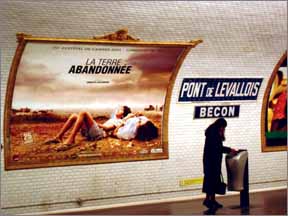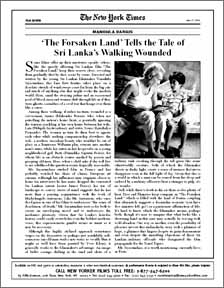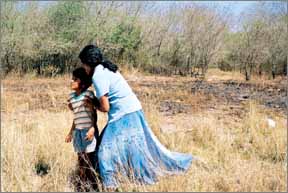Beyond the synthetic barriers and into the new vistas
Vimukthi Jayasundara - Sri Lankan filmmaker of
international repute :
|

Internationally acclaimed film director Vimukthi Jayasundara
addressing an audience after Sulanga Enu Pinisa was screened in
Newyork.
|
 Born and bred in the southern province, Vimukthi's entry into the
world of cinema was unprecedented as his maiden attempt at cinema 'Sulaga
Enu Pinisa' won the prestigious Camra d'Or at the Cannes film festival,
prior to its prevention from screening in Sri Lanka. Born and bred in the southern province, Vimukthi's entry into the
world of cinema was unprecedented as his maiden attempt at cinema 'Sulaga
Enu Pinisa' won the prestigious Camra d'Or at the Cannes film festival,
prior to its prevention from screening in Sri Lanka.
The outcry was, by and large, due to the artificial demonizing
campaign launched by cultural puritans and pseudo-moralists who live in
a make-believe world. While the international film community including
prestigious newspapers such as The New York Times published reviews on 'Sulaga
Enu Pinisa", Vimukthi received brick bats and threatening calls from
pseudo-moralists and racially inclined press.
Commenting on the restraining of the film from being screened in Sri
Lanka, Vimukthi acknowledged the fact that 'Sulanga Enu Pinisa' (The
Forsaken Land) had now been featured at more than 800 international film
festivals and earned the credit of the first Sri Lankan film to be
commercially released all over Europe, Japan, China and Greece.
|

Paris
|
 By now, a thousand copies of the film are in circulation worldwide.
The film's commercial success in Europe was phenomenal and won an
unparalleled international audience for a Sri Lankan film. Vimukthi has
also become a phenomenon in international filmdom and has already signed
contracts for two international productions; one an Indian and another
American. By now, a thousand copies of the film are in circulation worldwide.
The film's commercial success in Europe was phenomenal and won an
unparalleled international audience for a Sri Lankan film. Vimukthi has
also become a phenomenon in international filmdom and has already signed
contracts for two international productions; one an Indian and another
American.
A Considerable section of the Sri Lankan audience is immature and has
a poor understanding of art. This particular section responds only to
cricketers and politicians and not academics, professionals and
filmmakers. Producing art is not just coming as a gift of god, or Karma
but from the evolution of the conscious brain.
According to Vimukthi one should possess two perceptions to
understand art; one nativistic perception, a nuro-physical chemistry
that recognises one in one's environment and another directed perception
that depends on the person's knowledge, life experience, and art and how
that person deals with it and responds to it.
He claims that most of the Sri Lankan viewers had seen the art from
the nativistic perception. So most of the viewers could not understand
art as contemporary art and its diverse forms are complex.
Vimukthi is of the view that most of the Sri Lankan viewers judge
complex art on a superficial level and tend to reject outrightly without
piercing the outer layers and mining the deep meaning and the message
that the artist intended to convey through a piece of work.
It is pertinent that the audience should not reject a work of art on
the basis that they could not understand it and what they feel about the
work is not in conformity with their nativistic perceptions.
On the other hand, the artist could not come down to the audience's
level to produce cheap fantasies which merely appeal to the basic senses
and touch on the superficial contours of characters and settings with
absolutely no serious message for the audience.
Vimukthi is of the view that some of the newspaper articles,
especially, appeared in racially inclined press, denouncing the film as
work of inferior quality. The articles not only venomously attacked 'Sulanga
Enu Pinisa' but also the producer Upul Shantha Sannasgala.
Most of the Sri Lankans are conditioned and a lot of ground work has
to be done to change their mind-set which is based on ignorance and
misrepresentations. A process of re-education should be carried out to
make people sensitive and receptive to masterpieces of art.
 Vimukthi attributed this pathetic situation to gross ignorance, lack
of exposure to serious works of art and misconceptions built and
nurtured over the years by parties with ulterior motives. Vimukthi attributed this pathetic situation to gross ignorance, lack
of exposure to serious works of art and misconceptions built and
nurtured over the years by parties with ulterior motives.
This process of education should be commenced at school level,
particularly on arts as the art is the process that lead to creativity
and every other discipline including religion and science sprang from
that 'creativity', from the primitive stage where the primary concerns
of man were food, security and sex.
Then, man found something lacking in life. That is the beginning of
the art and every other subject sprang from it.
Although the concerned parties including some moralist and puritans
have denounced 'Sulanga Enu Pinisa' as dirty work misrepresenting the
country at large, another award winning film which apparently copied
some features from 'Sulanga Enu Pinisa', has been hailed as an authentic
work of art.
It is obvious that the Sri Lankan audience is ready to accept any
cheap fantasy as long as they address the imaginary idealistic society
that is only in their minds. They are wilfully oblivious to the stark
reality of the real world and the complex social fabric which had been
upturned by the changing economy and modern-day ethos.
****
Vimukthi Jayasundara born in Sri Lanka in 1977. Internationally
acclaimed Film director, copy writer. Studied at the Cinema and
Television Institute in India and Le Fresnoy, Studio National d'Art
Contemporain in France.
Served in the Jury of the Marseille Documentary Film Festival. Guest
Lecturer at the National Film University in Mexico and National Fine
Arts University in France.
In 2001, he directed a documentary the Land of Silence then a short
film, Vide pour l'amour was selected for the 2003 Cannes Film Festival
and was later screened at over fifty festivals worldwide and won several
prizes, including the prize for the Best Director at Nova Mesto Film
Festival - Slovenia in 2005 his 1st feature film was selected to
International Cannes Film Festival and won the prestigious Camra d'Or
award.
It was the first time a Sri Lankan had won an award at the
prestigious Cannes festival in the history of cinema. 'Sulanga Enu
Pinisa' is the first Sri Lankan film to be commercially released in
Europe, North and South America. In 2005, he was bestowed with title by
the President of Sri Lanka.
[email protected]
******
How international film critics receive 'Sulanga Enu Pinisa'
'Forsaken Land' offers a sighting of a potentially major new talent
'The Forsaken Land'.
|

Kaushalya Fernando and Supurni- A Scene from Sulanga Enu Pinisa |
Michael Wilmington, Tribune movie critic Published September 1, 2006
An extraordinary debut film from Sri Lankan writer-director Vimukthi
Jayasundara, "The Forsaken Land," is a stark, lyrical and affecting
portrait of war's aftermath as seen from the edges of the old conflict.
In images that sear themselves into your memory, Jayasundara shows a
watchful young girl (Pumidika Sapurni Peiris), a young soldier (Mahendra
Perera), his faithless wife (Nilupili Jayawardena) and devout unmarried
sister (Kaushalya Fernando) caught up in the events that follow a
cease-fire between rebels and the government.
Throughout, in barren landscapes that are deliberately meant to evoke
the absurdist nightmares of Franz Kafka and Samuel Beckett, the uneasy
peace seems as threatening as the preceding bloodshed.
Jayasundara's picture, which took the 2005 Cannes Film Festival
Camera d'Or for best first film (an award previously won by Dennis
Hopper and Spike Lee), is done with sparse dialogue and haunting
tableaux of the isolated rural landscape.
"Land" has some of the strange poetry of Ingmar Bergman's great 1968
anti-war film "Shame," but it's a more cryptic, exotic work, burningly
immediate yet imbued with some of the quality of timeless fable. Only
27, Jayasundara seems a moviemaker of high promise.
"Forsaken Land," a work of sophistication and cinematic eloquence,
may signal the arrival of a major international talent.
"Some films offer up their mysteries openly; others, like the quietly
affecting Sri Lankan film "The Forsaken Land," keep their secrets close,
revealing them gradually shot by shot, scene by scene." - New York Times
"Beautiful but withholding...[Jayasundara's] command of film language
is evident and his evocation of postwar trauma is haunting." - Village
Voice
"An extraordinary debut film... Forsaken Land, a work of
sophistication and cinematic eloquence, may signal the arrival of a
major international talent." -Michael Wilmington, Chicago Tribune
"Jayasundara has an undeniable gift for painting haunting images."
-Time Out Chicago
Avant-garde Storytelling Stunning Sri Lankan debut evokes Tarkovsky
BY STEVE ERICKSON Jayasundara is even more inclined towards abstraction
and revelling in nature's beauty than Tarkovsky, but his tracking shots
are similar. Almost every scene in "The Forsaken Land" is comprised of
just one shot. Each one plays like a mini-feature, often ending in a
surprising place. |
